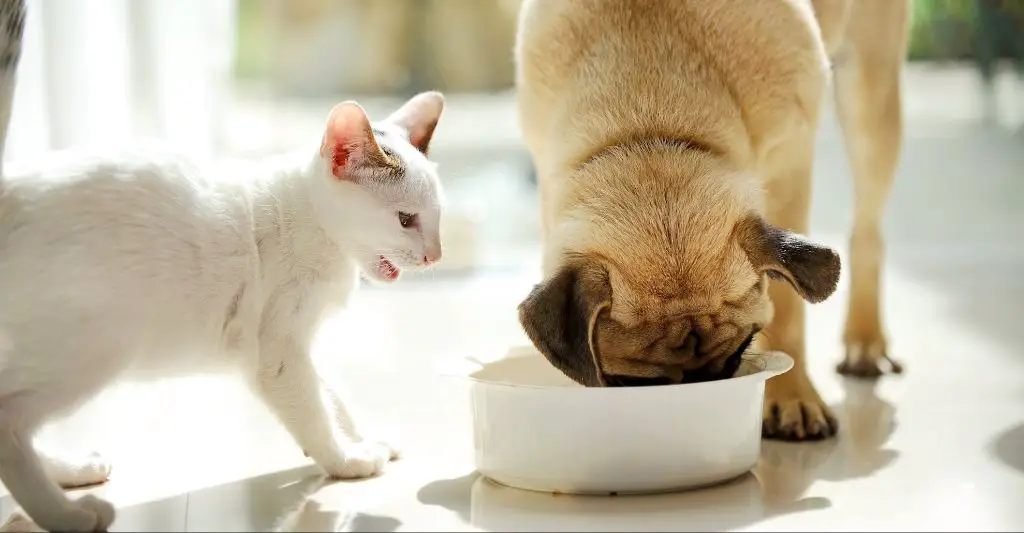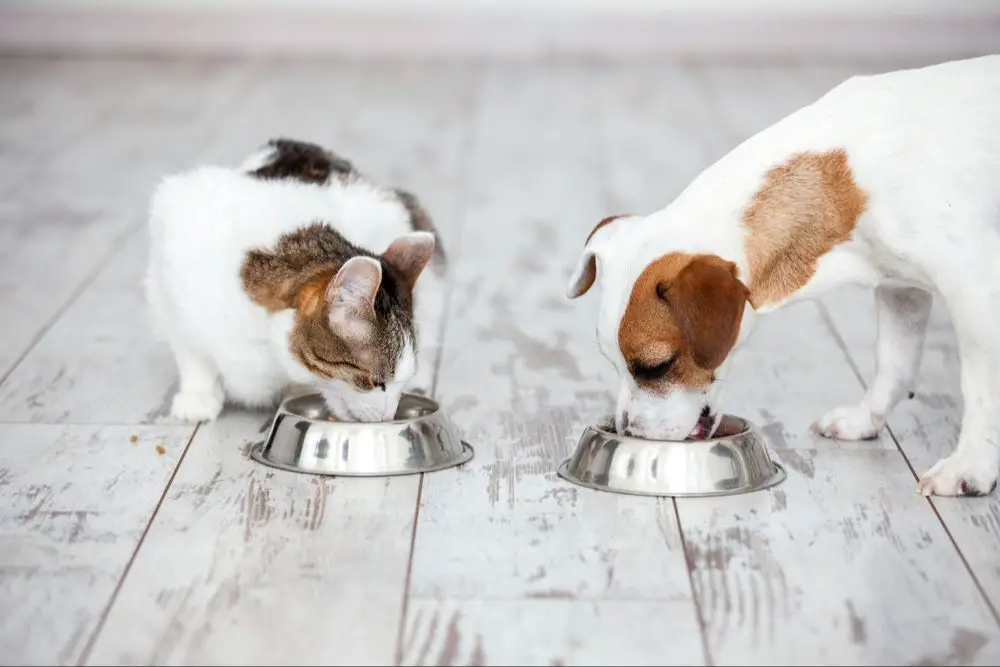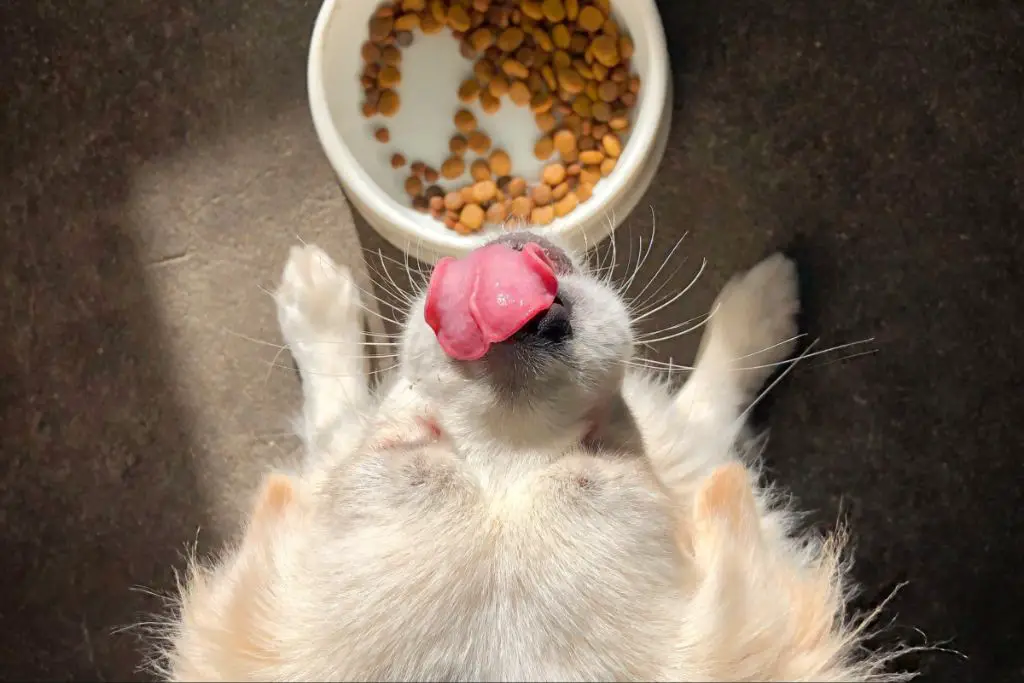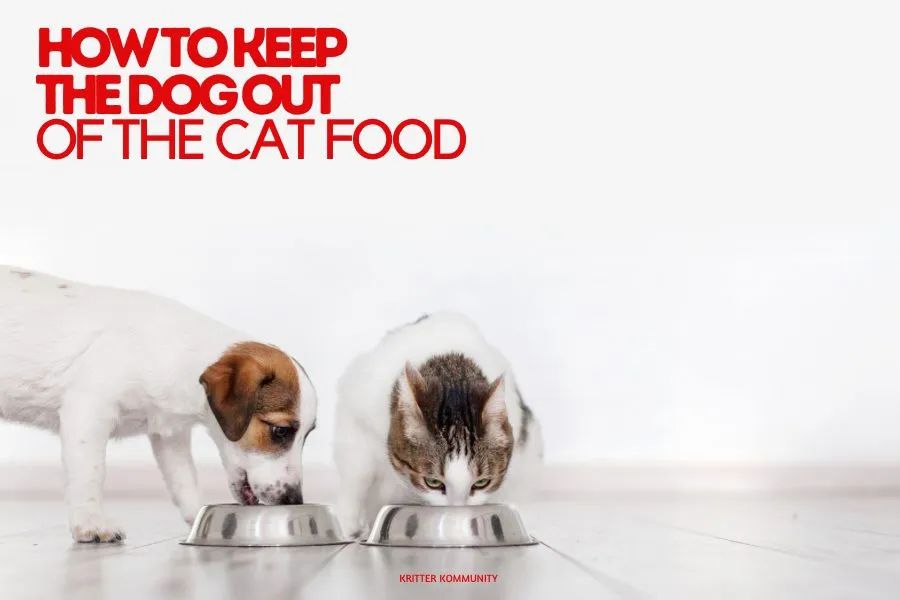Can Dogs Eat Cat Food?
Dogs can technically eat cat food in small amounts if necessary, but there are some key nutritional differences between cat and dog foods that make it far from ideal as a regular part of their diet. Cat foods tend to be much higher in protein and fat, and lower in carbohydrates compared to most dog foods (1). While the higher protein and fat levels may seem appealing, they can put dogs at risk for obesity and pancreatitis if consumed long-term. Cats are obligate carnivores and require higher protein in their diet, whereas dogs are more omnivorous and better adapted to a more balanced nutritional profile (2).
Eating cat food occasionally or in an emergency will not immediately harm a healthy dog, but the risks increase substantially if cat food becomes a major part of your dog’s diet. Consuming too much protein and fat and not enough vitamins, minerals, and fiber from other sources can cause gastrointestinal upset like diarrhea, vomiting, and constipation (3). Over many months or years, the strain on your dog’s organs from excess protein and fat may also increase the likelihood of liver and kidney disease (4).
In summary, while most dogs will readily eat cat food and even seem to enjoy it, cat food does not provide optimal nutrition for dogs. The occasional treat of cat food is unlikely to cause harm, but regular long-term consumption instead of dog food can lead to health problems. It’s best to keep your dog on a balanced dog food diet formulated specifically for their nutritional needs.
Sources:
(1) https://www.akc.org/expert-advice/nutrition/can-dogs-eat-cat-food/
(2) https://pethelpful.com/dogs/Dog-Eating-Cat-Food-Side-Effects-and-Risks
Nutritional Differences Between Dog and Cat Foods

There are some key differences in the nutritional composition of dog and cat foods. As cats are obligate carnivores, cat food tends to be higher in protein and fat compared to dog food.
According to Meow Mix, cat food on average contains about 50% more protein than dog food. It also contains 3 times as much fat and calories to account for cats’ higher energy needs [1].
Cats also require more taurine in their diet, an amino acid essential for feline health but not as critical for dogs. Many dog foods contain little to no taurine. Additionally, cats evolved as desert animals so they need more concentrated sources of nutrients and calories. That’s why cat foods contain up to 50% less fiber, allowing for better nutrient absorption.
While cat food meets all the nutritional needs for cats, it may lack certain vitamins, minerals, and amino acids dogs require for balanced nutrition. The higher fat and protein can also be hard on some dogs’ digestive and renal systems when fed long-term.
Dog Food Formulated Specifically for Dogs
Dog food is formulated to provide complete and balanced nutrition specifically for dogs. Unlike cat food, dog food contains optimal levels of protein, fat, vitamins and minerals that meet dogs’ nutritional needs.
Dog foods contain carbohydrates like rice, barley and oats that provide energy in the form of glucose. However, the carbohydrate levels are lower than in cat food, since dogs have less of a need for carbs. The main energy sources for dogs come from higher levels of protein and fat.
Protein makes up around 20-30% of high quality dog foods. It provides amino acids that help build and maintain muscles and organs. Meat, poultry, eggs and fish are excellent sources of protein for dogs [1].
Fat makes up around 15-20% of good dog foods. It supplies fatty acids for skin and coat health, and provides concentrated energy. Animal-based fats are better than plant-based oils, since they contain omega-3 and omega-6 fatty acids. These support the immune system, reproduction and more [1].
Dog foods also contain essential vitamins like A, B, C, D, E and K. Minerals like calcium, phosphorus, magnesium, iron, zinc, copper, manganese and selenium are crucial too. These all help regulate metabolism, growth, immune function and more in dogs [2].
By feeding dog food instead of cat food, you can ensure your dog gets the right blend of carbohydrates, protein, fat, vitamins and minerals. This optimizes their health, energy and longevity.
Potential Issues When Dogs Eat Cat Food
While the occasional snack of cat food is unlikely to harm a dog, regularly feeding cat food to dogs can lead to some problems due to the nutritional differences between cat and dog food. Cats and dogs have distinct nutritional needs, so cat food lacks some nutrients dogs require and contains excess amounts of other nutrients.
Some potential issues that may arise in dogs from eating cat food regularly or long-term include:
Nutritional Imbalances

Cat food is deficient in protein, fat and calories compared to dog food. It also has excessive vitamin A and D for dogs. This can lead to vitamin and mineral deficiencies or toxicities over time if a dog eats cat food regularly (source).
Weight Gain
The higher carbohydrate content in many cat foods compared to dog foods can cause weight gain in dogs. The fat and protein deficiencies can also increase hunger and lead to overeating (source).
Gastrointestinal Upset
The higher fiber content in cat food can irritate some dogs’ digestive systems. Dogs eating cat food may develop diarrhea, gas, or loose stools from the extra fiber their guts aren’t used to processing (source).
Pancreatitis
Some dogs may be susceptible to developing pancreatitis from the high fat content of many cat foods. Obese dogs are at greater risk for this potentially serious inflammatory condition (source).
Occasional Cat Food Won’t Hurt
The occasional piece of cat food here and there is unlikely to harm an otherwise healthy dog (1). While cat and dog foods are formulated to meet the nutritional needs of each respective species, having a few pieces of cat food will not cause deficiencies or toxicity in dogs in the short term. One study showed healthy adult dogs fed a single meal of cat food did not experience any detectable adverse effects (2).
However, cat food should not become a regular part of a dog’s diet or replace their regular dog food. Cat food does not have all the nutrients a dog needs over the long term. Over time, regularly feeding cat food instead of dog food can lead to nutrient deficiencies and health issues for dogs.
When dogs have an occasional nibble of cat food, owners should monitor them for signs of stomach upset or other issues. If none develop, the cat food likely did not cause problems. However, any ongoing vomiting, diarrhea, decreased appetite, lethargy after eating cat food, or other signs of illness warrant a vet visit.
Risks Increase with Regular Cat Food Consumption
While eating cat food occasionally may just lead to an upset stomach, regularly feeding cat food to dogs can pose more serious health risks. Cat food contains much higher levels of fat, protein, and calories compared to dog food. Feeding a high fat, high protein diet long-term can put dogs at risk for potentially life-threatening conditions like pancreatitis (inflammation of the pancreas) [1]. The higher calorie content can also lead to obesity if portions aren’t adjusted accordingly.
In addition, cat food lacks some nutrients that are important for dogs, like taurine. Taurine deficiency can cause heart disease and other health issues in dogs. So while an occasional meal of cat food likely won’t cause major deficiencies, feeding it regularly could lead to problems over time.
Finally, the higher fat content in cat food makes it more likely to cause gastrointestinal issues like vomiting and diarrhea in dogs. Ongoing digestive issues and potential diseases linked to a cat food diet will mean higher veterinary costs for lab tests, medications, and other treatments.
Signs Your Dog May Have Issues from Cat Food

If your dog eats cat food regularly or in large quantities, they may start exhibiting concerning symptoms and health issues. Here are some common signs your dog may be having problems from eating cat food:
Vomiting and diarrhea are two of the most common symptoms, according to the AKC[1]. The high fat and protein content in cat food can upset your dog’s stomach, causing nausea, vomiting and loose stools. These symptoms may start shortly after your dog eats cat food.
Weight gain is another potential issue, since cat food tends to be more calorically dense than dog food[2]. The extra calories can lead to obesity over time, which carries many health risks. Your dog may seem hungrier when eating cat food and gain weight rapidly.
Pancreatitis is a dangerous inflammation of the pancreas that can result from a high fat diet. Symptoms include abdominal pain, lethargy, weakness, loss of appetite, and vomiting[1]. Pancreatitis requires immediate veterinary care and can be fatal if untreated.
Your dog’s skin and coat may also suffer from nutritional deficiencies and imbalances when eating cat food long-term. You may notice shedding, dull fur, dry/flaky skin, and decreased energy levels.
In general, any sudden behavior or appetite changes in your dog after eating cat food could signal an underlying health issue that needs attention. Contact your vet if you have any concerns.
[1] https://www.akc.org/expert-advice/nutrition/can-dogs-eat-cat-food/
[2] https://blog.myollie.com/why-is-cat-food-bad-for-dogs/
Transitioning Your Dog Back to Dog Food
If your dog has been eating cat food regularly, it’s important to slowly transition them back to dog food over 5-7 days to avoid gastrointestinal upset. Start by mixing a small amount of the new dog food in with the cat food, gradually increasing the proportion of dog food each day. According to the American Animal Hospital Association, cats may require up to 40 days for a full transition, so be patient with your dog as their digestive system adjusts (Tips and Timelines for Transitioning Your Pet to a New Food).
On the first day, do a 75% old food, 25% new food mixture. On day two, shift to 50% old food, 50% new food. On day three, move to 25% old food, 75% new food. By day four you should be feeding 100% new dog food. If your dog experiences soft stool or diarrhea, slow the transition by keeping the ratio of old to new food a bit more constant for a few extra days. You can also try mixing in some cooked white rice or boiled chicken to their meals to encourage normal stools.
With patience and gradual change, you can successfully transition your dog from cat food back to a nutritionally balanced dog food diet.
Prevention Tips
The best way to prevent your dog from eating cat food is to feed them a proper diet formulated specifically for dogs. Dog food contains the right balance of protein, fats, vitamins and minerals that dogs need (Source). Do not give your dog any table scraps or people food, as this can encourage food-seeking behaviors.

It’s also important to exercise portion control when feeding your dog. Feed them the amount recommended based on their weight and activity level, split into 2-3 meals throughout the day. Make sure you are not overfeeding. An overweight dog is more likely to scavenge for extra food sources like cat food.
Securely storing your cat and dog food can also help prevent stealing. Keep dog and cat food bowls in separate areas. Store dry food in containers with tight lids. Place cat food up high where your dog can’t reach it. Feed cats scheduled meals rather than free feeding (Source).
When to Call the Vet
While occasional cat food intake likely won’t harm your dog, you should contact your veterinarian if your dog exhibits any of the following symptoms after eating cat food:
- Repeated vomiting or diarrhea that lasts more than 24 hours (1)
- Noticeable weight loss over a short period of time (2)
- Lethargy, weakness, or other signs of illness (3)
- Signs of abdominal pain like whining, stretching, or tender belly (4)
- Symptoms potentially related to pancreatitis like vomiting, abdominal pain, diarrhea, loss of appetite, lethargy (5)
These symptoms may indicate your dog’s digestive system is struggling to handle the higher fat, protein, and mineral content in cat food. Persistent vomiting and diarrhea can also lead to dehydration. Seek prompt veterinary care if any of these concerning signs develop after your dog eats cat food.
Your vet can examine your dog and run tests to check for issues like pancreatitis, kidney problems, or gastrointestinal irritation. They may recommend IV fluids, anti-nausea medication, dietary changes, or other treatments to help get your dog back on track.
Catching these problems early can help prevent serious complications. Don’t hesitate to call your vet if your dog has ongoing symptoms after eating cat food.
